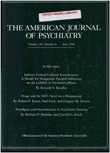Will neurobiology influence psychoanalysis?
Abstract
Neurobiologic research has begun to elucidate brain mechanisms of affective states and behavioral patterns. Discussions of anxiety and sexual identity demonstrate how these researches lead the psychoanalyst to broader views of behaviors that were previously considered entirely psychological in origin. While introspection and extrospection are distinct realms of investigation and conceptualization, they share common boundaries and areas of interpenetration. Psychoanalytic theory is challenged to accord with newer findings in biology and to provide important questions for further research. Neurobiologic advances will continue a centuries-old process of confining the realm of psyche, but there is no danger that mind will disappear.
Access content
To read the fulltext, please use one of the options below to sign in or purchase access.- Personal login
- Institutional Login
- Sign in via OpenAthens
- Register for access
-
Please login/register if you wish to pair your device and check access availability.
Not a subscriber?
PsychiatryOnline subscription options offer access to the DSM-5 library, books, journals, CME, and patient resources. This all-in-one virtual library provides psychiatrists and mental health professionals with key resources for diagnosis, treatment, research, and professional development.
Need more help? PsychiatryOnline Customer Service may be reached by emailing [email protected] or by calling 800-368-5777 (in the U.S.) or 703-907-7322 (outside the U.S.).



